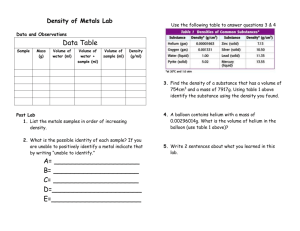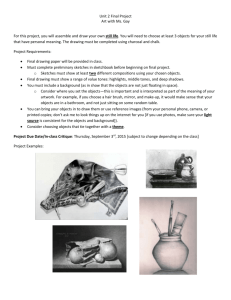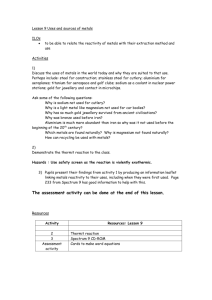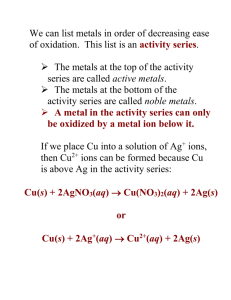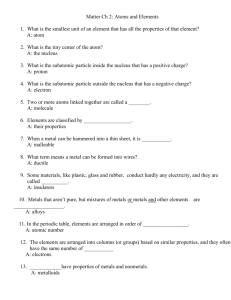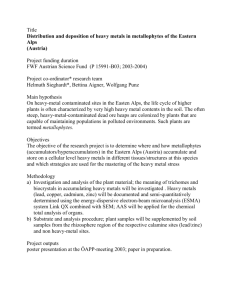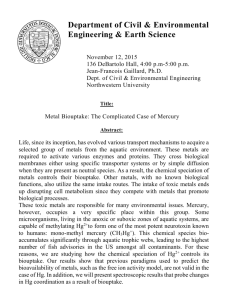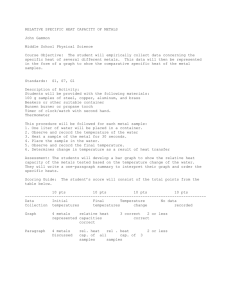Materials Design & Technology General Metals
advertisement
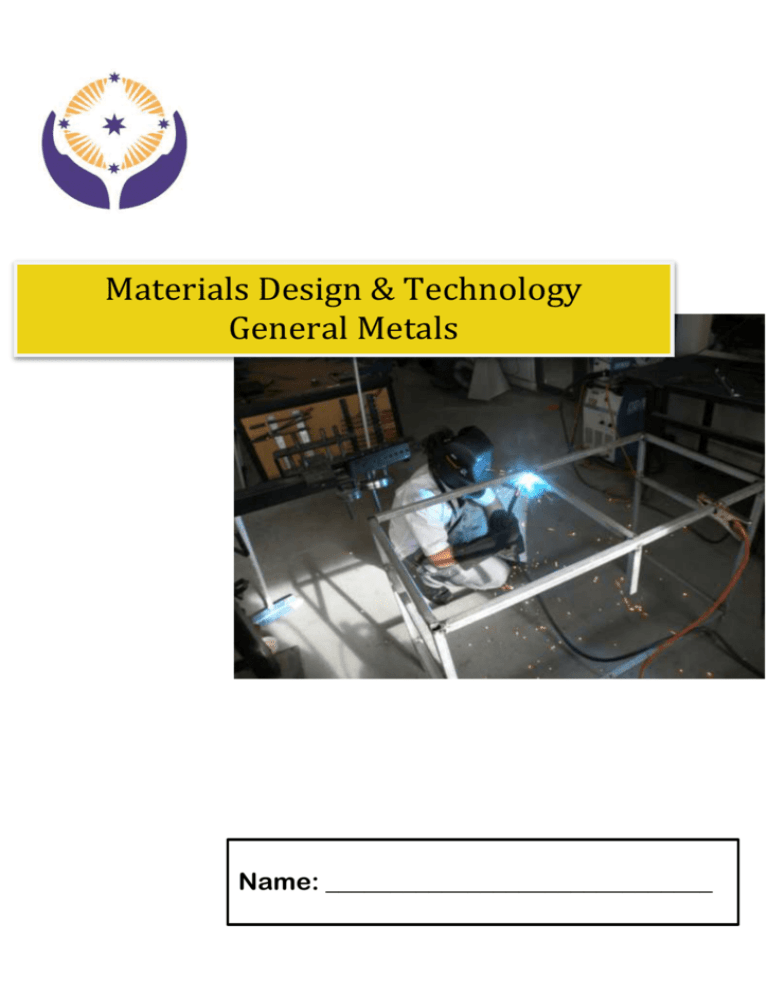
Materials Design & Technology General Metals Name: ______________________________ Irene McCormack Catholic College Materials Design & Technology - General Metals Programme Outline Week 1-3 Semester 1 Key Teaching Points Overview of unit and assessment requirements Safety correct use of PPE (personal protective equipment) where applicable (Occupational Safety and Health) practices in workshops when working with a variety of materials, tools and machines appropriate to situation General Workshop safety practice. Task 1A – G Clamp Design Design fundamentals and skills using communication techniques sketching annotating sampling modelling sketches of personal product ideas with development of images to a final solution Teacher demonstrate basic freehand sketching techniques. Students complete a series of freehand exercises. Students to draw a freehand sketch of the G clamp for submission in folio. 3-9 Teacher guided drawing of G clamp using sketchup. Students create Components Drawing with corresponding materials list Orthogonal drawing in 3rd angle projection. All drawings are printed and placed in folio. Use of technology Skills and techniques name and correctly use common tools: measuring tools files and filing vice hacksaws and blades hammers hand tools for cutting pedestal drill/drill press fold and shape metals using anvil, jigs, bending machines or metal lathe demonstrate gas or electric methods of welding metals including metal Irene McCormack Catholic College Materials Design & Technology - General Metals preparation, set up, welding operations and testing demonstrate workshop clean-up procedures. Task 1B Glamp Production Students complete a production plan and identify steps in production. Production is split into stations. Lathe operations to turn spindle to size and cut thread. Lathe operations to drill and cut thread using Tap in Vice. Marking out and cutting components for for G Clamp frame. Welding Bays – complete one practice weld prior to welding Clamp. Students to weld clamp together. Students cycle around stations until completion of project. Materials identify by appearance and name, metals used in the workshop identify differences in metals based on the basic aesthetic and physical properties of colour and work characteristics Students identify different types of metal by 1. Section - Round & Flat Bar 2. Properties – Bright and Black mild steel. Students select appropriate materials – eg Bright Bar for thread cutting. Week 11 - 13 Key Teaching Points Task 2A Tool Box Design Design fundamentals and skills Free hand sketching techniques to draw perspective drawing of Tool Box Identifying product use and establishing statement of intent. factors affecting design aesthetics function social requirements Students write statement of intent and begin drawing Freehand concept sketch of tool box and develop design solution Drawing a development drawing to scale using sketch up. Materials in context identify methods of reducing waste. Students submit a scaled cutting plan that demonstrates most effective use of sheet Irene McCormack Catholic College Materials Design & Technology - General Metals 14-18 metal. Task 2B Tool Box Construction Skills and techniques Methods for marking out using, Odd leg Jenny, Scribe Ruler Methods for cutting sheet metal using Guillotine, Bench shears, Tin Snips, Aviation Snips bending sheet metal using Pan Brake Bender, Magna Bend, plastic Mallet Methods of Joining Sheet metal, Spot welding and Riveting. Students construct Tool Box. Including Hasp and staple and handle. 19 – 20 Apply finish to tool box using spray equipment. Safety requirements when handling and storing paint materials. Set up and cleaning of spray equipment. evaluate: when investigating and devising product against initial design. Students write an evaluation of their final product and outline their production process. To be submitted with Task 2A – Design Folio. Week 1 -3 Semester 2 Key Teaching Points Task 3A – Table Design Students are given an openended design brief with some basic parameters. Design fundamentals and skills investigate: personal or others’ design needs and values design fundamentals aesthetics function safety cost factors affecting design aesthetics function social requirements environmental requirements existing ideas and products devise: design ideas using annotated sketches using communication techniques sketching annotation samples Irene McCormack Catholic College Materials Design & Technology - General Metals models solution drawings or sketches with measurements or dimensions production plan materials list materials costing evaluate: design concepts against design brief finished product against initial design criteria. Use the Technology process as basis of design folio Students create a design brief building on the drawing skills learnt in previous tasks and extend the content of their folio adding research of existing products and devising a personal design solution. Evaluating products based on aesthetics, Function, purpose….. Students to identify the materials they intend to use joining methods etc. Using freehand sketching to conceptualise design solutions and produce basic plan drawings. Skills and techniques use basic ICT skills use graphic communication skills appropriate to situation: isometric and pictorial hand sketches for project development dimensioned orthogonal drawing in 3rd angle for working drawing select appropriate materials and calculate the correct amount required for completion of project perform basic calculations for costing of project materials Materials identify and name common metal sections: bar and tube 4 – 10 Task 3B Table Construction Students use technology skills to construct their table design. Skills and techniques select and apply appropriate and accurate marking out tools and techniques, which may include the use of a rule, square, combination squares, scriber, inside/outside callipers apply skills using a range of tools and machinery (including the safe machine operation) for: cutting, shaping and folding techniques welding equipment, both gas and electric pedestal grinder and/or buffing machine select correct hacksaw blades and use different techniques of cutting metals select and use the correct type and grade of hand file select and use the correct type and grade of abrasive cloth Irene McCormack Catholic College Materials Design & Technology - General Metals preparing metals for surface finishing use correct processes to apply metal finishes: paint or lacquers Demonstrate a range of bending and shaping techniques using Scroll formers and hydraulic benders. Methods of machine cutting including: Cold saw, Plasma cutter and grinder. Teacher to work with students individually to complete projects according to design folio. Production management complete production processes: maintain time management follow planned sequential instructions for manufacturing materials list and costing evaluate ongoing processes use communication techniques to record any changes to the production processes, required to complete finished product Students complete a production journal outlining a basic production procedure and time management to be placed into folio with Task 3A. Materials Research Assignment Response Task 1 Nature and properties of materials understand the differences between ferrous, non-ferrous and alloys identify common metals: mild steel stainless steel tool steel aluminium zinc alloys—brass and solder classify these common metals by appearance, hardness, weight and cost identify the basic physical and aesthetic properties related to function of at least two of these metals 11 - 14 Task 4A – Free choice project. Students chose form a list of suggested projects or create a design proposal for a project based on a personal need. Students create a Design folio that demonstrates all skills learnt through the year. Design fundamentals and skills investigate: personal or others’ design needs and values design fundamentals aesthetics function safety cost factors affecting design aesthetics Irene McCormack Catholic College Materials Design & Technology - General Metals function social requirements environmental requirements existing ideas and products devise: design ideas using annotated sketches using communication techniques sketching annotation samples models solution drawings or sketches with measurements or dimensions production plan materials list materials costing evaluate: 14 - 20 design concepts against design brief finished product against initial design criteria Task 4B Free Choice Construction. With aid from the teacher students manage the production process of their final project demonstrating a range of technology skills Production management complete production processes: maintain time management follow planned sequential instructions for manufacturing materials list and costing evaluate ongoing processes use communication techniques to record any changes to the production processes, required to complete finished product.
